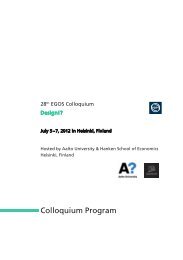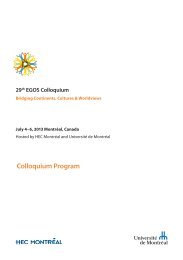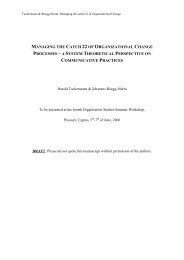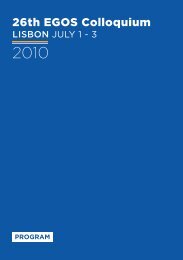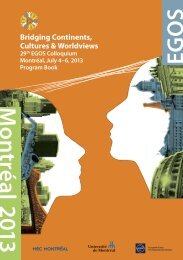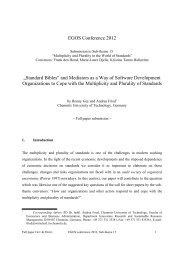A single set of standards and the multiplicity of interpretations - EGOS
A single set of standards and the multiplicity of interpretations - EGOS
A single set of standards and the multiplicity of interpretations - EGOS
Create successful ePaper yourself
Turn your PDF publications into a flip-book with our unique Google optimized e-Paper software.
Pr<strong>of</strong>it is frequently used as a measure <strong>of</strong> performance or as <strong>the</strong> basis for o<strong>the</strong>r<br />
measures, such as return on investment or earnings per share. (FW 69)<br />
Voittoa käytetään usein toiminnan tuloksen kuvaajana tai pohjana muille tunnusluvuille<br />
kuten pääoman tuotolle ja osakekohtaiselle tulokselle. (FW 69)<br />
Here <strong>the</strong> Finnish word voitot ‘gains’ is <strong>the</strong> plural <strong>of</strong> <strong>the</strong> word voitto which is <strong>the</strong> Finnish<br />
equivalent to ‘pr<strong>of</strong>it’. Thus <strong>the</strong> same target language term has been used as an equivalent to two<br />
different source language terms. While <strong>the</strong> translation <strong>of</strong> <strong>the</strong>se terms is seemingly inconsistent,<br />
<strong>the</strong> purpose <strong>of</strong> this investigation is not to argue that <strong>the</strong> translation would be incorrect. What is<br />
more, <strong>the</strong> term pr<strong>of</strong>it is not explicitly defined in <strong>the</strong> Framework <strong>and</strong> it has been argued that <strong>the</strong><br />
concept <strong>of</strong> pr<strong>of</strong>it in IAS1 is inconsistent <strong>and</strong> even flawed (Barker 2010). Even though income is<br />
defined in IFRS <strong>and</strong> <strong>the</strong> <strong>st<strong>and</strong>ards</strong> repeatedly use <strong>the</strong> terms income, expenses <strong>and</strong> pr<strong>of</strong>it, <strong>the</strong>re are<br />
also o<strong>the</strong>r similar terms in <strong>the</strong> English language <strong>and</strong> <strong>the</strong>se concepts might not fit toge<strong>the</strong>r as<br />
nicely <strong>and</strong> unambiguously in o<strong>the</strong>r accounting texts. For instance, especially Nor<strong>the</strong>rn American<br />
accountants sometimes talk about net income or earnings instead <strong>of</strong> pr<strong>of</strong>it. Fur<strong>the</strong>r, <strong>the</strong><br />
definitions <strong>of</strong> gains <strong>and</strong> revenues are vague in that no clear cut distinction between <strong>the</strong> two is<br />
made. This echoes a concern raised by one <strong>of</strong> <strong>the</strong> interviewed review committee members:<br />
And <strong>the</strong>n, relating to <strong>the</strong> terminology. It has been clear to us in Finl<strong>and</strong> what is expenditure (Fi<br />
meno), what is expense (kulu) <strong>and</strong> what is a cost (kustannus) but in English it is a lot less welldefined<br />
because <strong>the</strong> term cost encompasses costs in cost accounting but it is also meno<br />
‘expenditure’ in o<strong>the</strong>r contexts as meno would be defined in Finnish. When <strong>the</strong> same term has<br />
varying content in English, it is utopist to think that some absolute consistency could be reached.<br />
There have been some differences in usage, <strong>and</strong> probably will be because <strong>of</strong> <strong>the</strong>se traditions.<br />
Interviewee 2<br />
In order to make a way into to <strong>the</strong> logic <strong>of</strong> term choice in <strong>the</strong> translated st<strong>and</strong>ard, we need to<br />
underst<strong>and</strong> <strong>the</strong> text-external background in which <strong>the</strong> concept systems <strong>of</strong> <strong>the</strong> source language <strong>and</strong><br />
<strong>the</strong> target language are embedded: While IFRS applies <strong>the</strong> balance sheet approach, <strong>the</strong> previous<br />
Finnish accounting thought historically relied on <strong>the</strong> flows based income statement approach, <strong>and</strong><br />
<strong>the</strong> balance sheet only contained residual items. This fundamental difference between <strong>the</strong><br />
underlying accounting <strong>the</strong>ories may have led to <strong>the</strong>se terminological problems in <strong>the</strong> translation<br />
<strong>of</strong> IFRS: The Finnish <strong>and</strong> English concepts do not neatly overlap with each o<strong>the</strong>r because <strong>the</strong><br />
English language concepts are interrelated to each o<strong>the</strong>r differently than <strong>the</strong> Finnish ones.<br />
15



